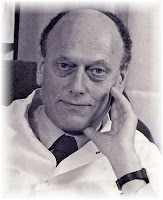
The Illusion of Free Will: Physicist Amit Goswami, Sage Ramesh Balsekar, and Neuroscientist Benjamin Libet
Balsekar: [On free choice:] A personal awareness of that choice comes about 1/2 second later than a "readiness potentia" that appears in the brain wave, per brain surgeon Benjamin Libet. Thus there can be no free will, that most precious "possession" in the West. The Indian sage Ramana Maharshi said the same thing. You see the way I interpret it, in simple language, is this. In the ocean of consciousness there are possibilities. And quantum mechanics as I understand it, what is going to happen then is not really known. . . . And in that pool of consciousness which particular possibililty becomes a fact, is not known. So if I say, "I have a thought," this means, as I understand it, what it really means is that thought has occurred half a second before I say, "it is my thought."
Goswami: That's right. That identity takes half a second to come about.
Balsekar: My interpretation as a layman is this . . . that a thought comes as one of the actualities from the pool of possibilities, and what comes from the pool of possibilities is outside my control, there is nothing I can do. And that thought arises, the brain reacts to that thought, and the reaction of the brain is what I choose to call my action, whereas it is not my reaction. It is a reaction of the brain to a thought that occurred a half-second earlier. Which I say is my thought!
Goswami: One can say that there is a choosing consciousness but certainly that's not the ego function.
Balsekar: Yes. Quite. So from the pool of consciousness, consciousness selects a particular thought.
Goswami: And that consciousness is what we variously call God, or the universal God.
Balsekar: On this particular thing, would you like to expand it? As it says, "the most prized possession of the West."
Goswami: I'd like to just make the Western view a little bit more palatable, by saying that the West does not make a complete mistake of this, because the very good thinkers of the West recognize that the action of free will is actually the action of surrender. There is action of free will by the human because human beings are separate from God, so the only way the only status the human being can have is to surrender to God's will. And there is no real distinction because there is only one world operating, so as soon as we learn to surrender then we are actually accepting free will.
Balsekar: So that means, what you are really surrendering is your concept of living . . . isn't it? What else do you have to surrender, what capital do you have to surrender to God from whom you have received everything? You have only the concept that you have free will to surrender. So that is why I often say, my only point is that nothing is in your control. Anything that happens is part of the impersonal functioning of the totality of consciousness, or the will of God.
Goswami: Libet is a very good neurophysiologist. He had done another experiment, related to the other experiment which shows clearly what you are saying. First of all, people are asked to will to raise their hand when they choose. So they will to raise their hand. Of course as indicated by the other experiment, half a second before they are willing, the experimenter looking at the EEG machine of course already knows that. But let me tell you. Then he said, "even after you become aware of your willing, try to see if you can stop yourself from raising your hand". So they did the experiment, and they found that when they were given the choice of negating the action, they could do it. So the conclusion is that the only little amount of escape hatch that consciousness retains in a state of identification with the ego is the ability to say no to a conditioned action. There is no free will there. We can stop ourselves even at that ego identification. More from The Online Bulletin of Science Within Consciousness
_____________________________________
My comments: Given that, as Libet's experiments suggest, the sense of conscious will is illusory, what then? His findings have implications for both belief in conscious will and for disbelief. Conditioning changes, depending on belief or disbelief. Belief in the sense begets one kind of conditioning; disbelief, another. Belief that one does have conscious will has brought about the conditions which provided for technological and political advances of the West. The essential point: even if conscious will is an illusion, belief or disbelief in conscious will has consequences conditioned by mind set toward the issue. These conditioned consequences shape individual lives and whole cultures.
Apart from illusions, the question of belief value arises. If something is judged as illusory, does that mean it is not valuable? It certainly had evolutionary survival value. If valuable in the context of human effects, illusion or not, it profits humanity.
The effects of Shakespeare or an elegant mathematical formula can be regarded as illusory. (Eastern thinkers would brush aside such effects as part of the dream called life. This is not the Western temperament. In his later years, Mark Twain was deeply troubled by questions of reality, exploring them in his works. In The Mysterious Stranger, the story's conclusion yields a Western, not Eastern, perspective. He wrote, Dream bigger dreams and better.)
Also note that Balsekar says that Consciousness chooses ("selects a particular thought"). No chooser, only the sense of choosing: this concept need not be fatalistic, but taken in the context of Balsekar's other writings it must be construed as fatalistic. Balsekar has said that his life has already been "chalked up."
But Quantum Theory indicates no fatalism in the universe. Rather, its evidence reveals indeterminism (Bohr) or determinism (Bohm), depending on the theorist, and this is an entirely different understanding. Nothing is already "chalked up." To use Balsekar's concept that Consciousness chooses, one can also infer that choice occurs in the moment, that nothing is predetermined. (See Daniel Dennett & choice machines, 8 January article above.)
Goswami points out that Libet's subjects can negate a hand's rising, "telling" it not to rise. This ability to negate an action is significant in that it accords with Eastern teachings, which stress attention to one's thoughts, deeds, and movements. Attention is taught as the only escape from ignorance. With attention, one can be alert to thought, deeds, and movements; by this alertness, he can stop their arisings and eventually decondition himself.
Goswami says this negation in Libet's subjects is not free will. Why is it not? If he means actions are not initiated and freely selected out of a field of opportunity, yes, he is correct. But it can still be considered a form of free will in that it either ratifies or vetoes an action arising in the sequence of conditioning. (As a term, free will has become too all-encompassing.)
More on free will: Benjamin Libet, 8 November below; Losing Control, 9 December; Daniel Wegner, 12 December; Daniel Dennett, 15 December
Home
















